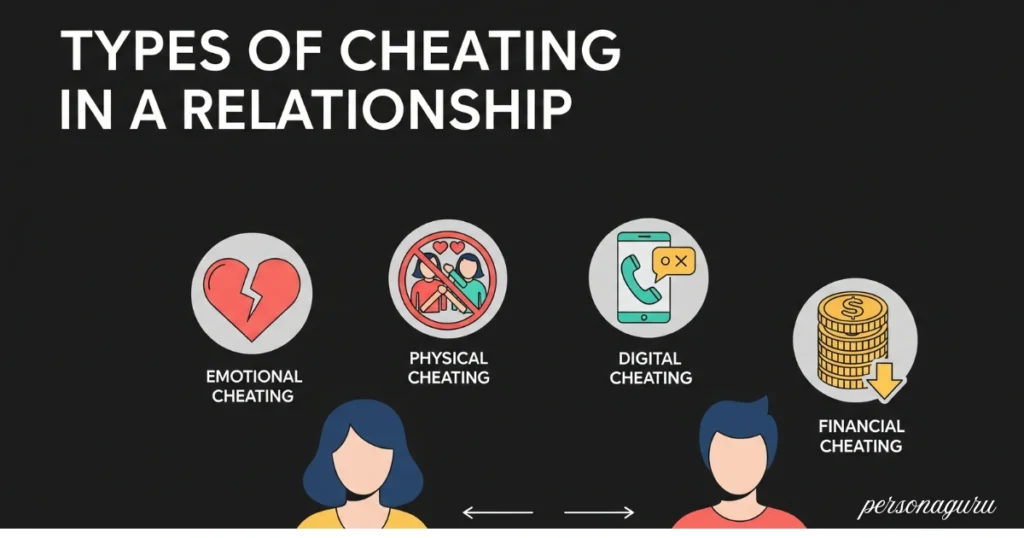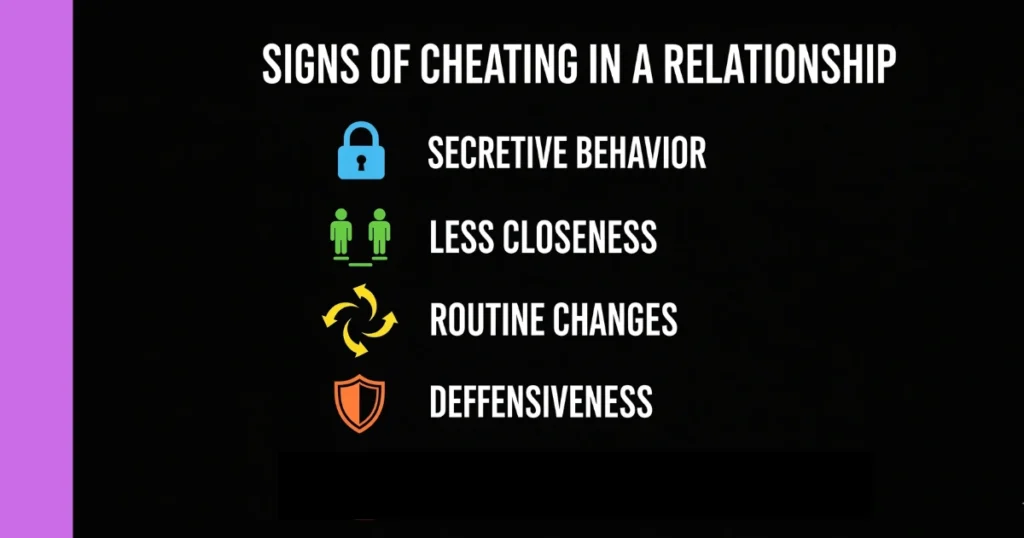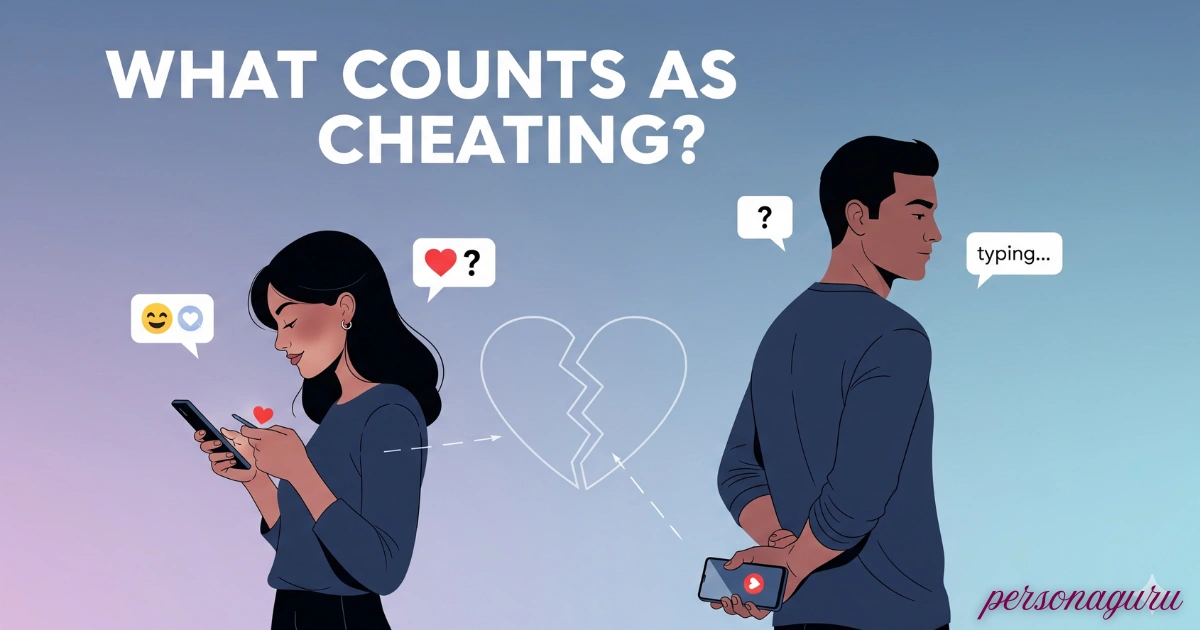Last updated on February 1st, 2026 at 05:12 pm
What counts as cheating in a relationship today? Is it just about physical affairs, or can emotional closeness and online flirting also be cheating? Cheating means breaking the trust between you and your partner. It’s not always obvious and can include things like secret messages or hidden social media interactions.
This article will explain what cheating really is, the different types, examples to watch out for, and common signs. Everything is explained in simple words to help you understand and protect your relationship.

What is Infidelity?
Cheating in a relationship happens when you do something that betrays your partner’s trust, usually in secret. To define cheating in a relationship, it’s any action that goes against the rules or expectations you both set, like hiding texts or getting too close to someone else. It’s not just about kissing or sleeping with someone—it can be emotional or even online behavior that hurts your partner.
For example, secretly messaging an ex or sharing personal feelings with a friend instead of your partner can feel like a betrayal. Cheating matters because it breaks the honesty and safety that relationships need. Every couple has different rules, so what’s cheating for one might be okay for another. The key is knowing what you and your partner agree on.
What is Considered Cheating in a Relationship?
So, what is considered cheating in a relationship? It depends on your relationship’s boundaries, but most people agree on some common things that are considered cheating in a relationship:
- Physical acts: Kissing, touching, or having sex with someone outside your relationship.
- Emotional closeness: Sharing deep feelings or secrets with someone else, leaving your partner out.
- Online behavior: Sending flirty messages, liking suggestive posts, or using dating apps behind your partner’s back.
- Hiding things: Keeping secrets, like deleting texts or lying about who you are with.
For instance, if you are texting someone and hiding it from your partner, it might count as cheating because it breaks trust. A survey by a trusted family research group found that most couples see emotional betrayals as just as serious as physical ones. What do you think counts as cheating in your relationship? Talking about boundaries with your partner can clear things up.
Types of Cheating
Not all cheating looks the same. Knowing the types of cheating in a relationship helps you spot what might hurt your partner. Here’s a breakdown:

Physical Cheating
This is when someone gets physically close to another person, like kissing or having an affair. For example, a quick kiss at a party that you don’t tell your partner about is physical cheating.
Emotional Cheating
This happens when you share your deepest thoughts or feelings with someone else instead of your partner. For instance, venting about your relationship to a coworker and feeling closer to them can create emotional distance at home. Learn more about the importance of emotional closeness and how it nurtures healthy intimacy in our article on Understanding Emotional Intimacy in Relationships.
Digital Cheating
With phones and social media, digital cheating is common. This includes flirty texts, private messages on platforms like Instagram or X, or even browsing dating apps. Liking someone’s suggestive post might seem small, but it can hurt trust.
Financial Cheating
Hiding money or secret spending, like racking up credit card bills your partner doesn’t know about, is another way to break trust. It’s less obvious but still damaging.
What is Micro-Cheating in a Relationship?
Micro-cheating in a relationship means small, sneaky actions that feel like betrayal but aren’t full affairs. Think liking an ex’s photo on Instagram, texting someone “just as friends” without telling your partner, or keeping a dating app profile active. These little acts can add up and make your partner feel insecure.
Each type depends on what you and your partner agree is okay. Talking openly about what’s off-limits can prevent misunderstandings.
Examples of Cheating in a Relationship
To make it clear, here are examples of cheating that show how it happens:
- Physical: Jake goes to a bar and kisses someone after a few drinks, never telling his girlfriend.
- Emotional: Sarah shares her work stress and dreams with a friend instead of her boyfriend, building a secret connection.
- Digital: Priya sends flirty emojis to an old crush on X and deletes the messages so her partner doesn’t see.
- Micro-cheating: Tom keeps liking his ex’s posts on social media, saying it’s “no big deal,” but it upsets his partner.
- Financial: Alex hides a big online shopping spree from their spouse, claiming it’s just “work stuff.”
These things that are considered cheating in a relationship show how betrayal can take many forms. Even small actions, like secret chats, can hurt if they are hidden from your partner.
Signs of Cheating in a Relationship
Wondering if something’s off? Here are some signs that cheating might be happening, including signs of emotional cheating:
- Secretive behavior: Your partner hides their phone, locks apps, or gets nervous when you are near their screen.
- Less closeness: They stop sharing feelings or seem distant, even when you are together.
- Routine changes: Staying out late without explanation or sudden “work commitments.”
- Defensiveness: They get upset or angry when you ask simple questions about their day.
For emotional cheating, watch for your partner turning to someone else for support or spending lots of time with a “friend.” If you notice these signs, don’t assume, talk to your partner calmly to understand what’s going on.
Related read: Cheating Wife: Signs, Emotional Damage & What to Do Next

How to Address Cheating in a Relationship
If you suspect cheating or want to strengthen your relationship, here’s what you can do:
- Talk Honestly: Share how you feel without blaming. Try saying, “I’ve noticed you seem distant—can we talk about it?”
- Set Boundaries: Agree on what’s okay, like whether flirty texts or social media interactions are off-limits.
- Get Help: Couples counseling can guide you through tough conversations. Apps like Talkspace or BetterHelp make it easy to find support.
- Reflect Together: Think about what you both need to feel safe and valued in the relationship.
Healing from cheating takes time, but many couples rebuild trust with open talks and effort. Be kind to yourself and your partner as you work through it.
Final Thoughts
Cheating in a relationship is about more than just physical acts, it’s any secret behavior that breaks trust, from flirty messages to emotional closeness with someone else. By understanding what is considered cheating in a relationship, the types of cheating, and real examples of cheating in a relationship, you can set clear boundaries and protect your connection.
Spotting signs early and talking openly can keep your relationship strong. What’s one boundary you did set to avoid cheating?
Share your thoughts below or check out our guides on healthy relationships and communication.
FAQs
What is Considered Cheating in a Relationship?
What is considered cheating in a relationship includes any secret action that breaks trust, like kissing someone else, sharing deep feelings with another person, or sending flirty messages online.
What Are the Types of Cheating in a Relationship?
The types of cheating are physical (e.g., kissing), emotional (e.g., confiding in someone else), digital (e.g., flirty texts on X), and financial (e.g., hiding money).
What is Micro-Cheating in a Relationship?
Micro-cheating in a relationship refers to small, sneaky acts like liking an ex’s Instagram posts or texting someone secretly, which can hurt trust even if they seem minor.
What is the Definition of Cheating in a Relationship?
The definition of cheating in a relationship is any hidden action, like physical intimacy or emotional closeness with someone else, that goes against your partner’s trust and agreed rules.
What are Examples of Cheating in a Relationship?
Examples of cheating in a relationship include secret kisses, sharing personal feelings with a friend, sending flirty emojis on X, or hiding a big purchase from your partner.
How Can I Stop Cheating in a Relationship?
To stop cheating in a relationship, talk openly about your needs, set clear boundaries, seek couples counseling if needed, and commit to being honest with your partner.
Sources: Family research surveys, trusted counseling platforms like Talkspace and BetterHelp.
Sources:

